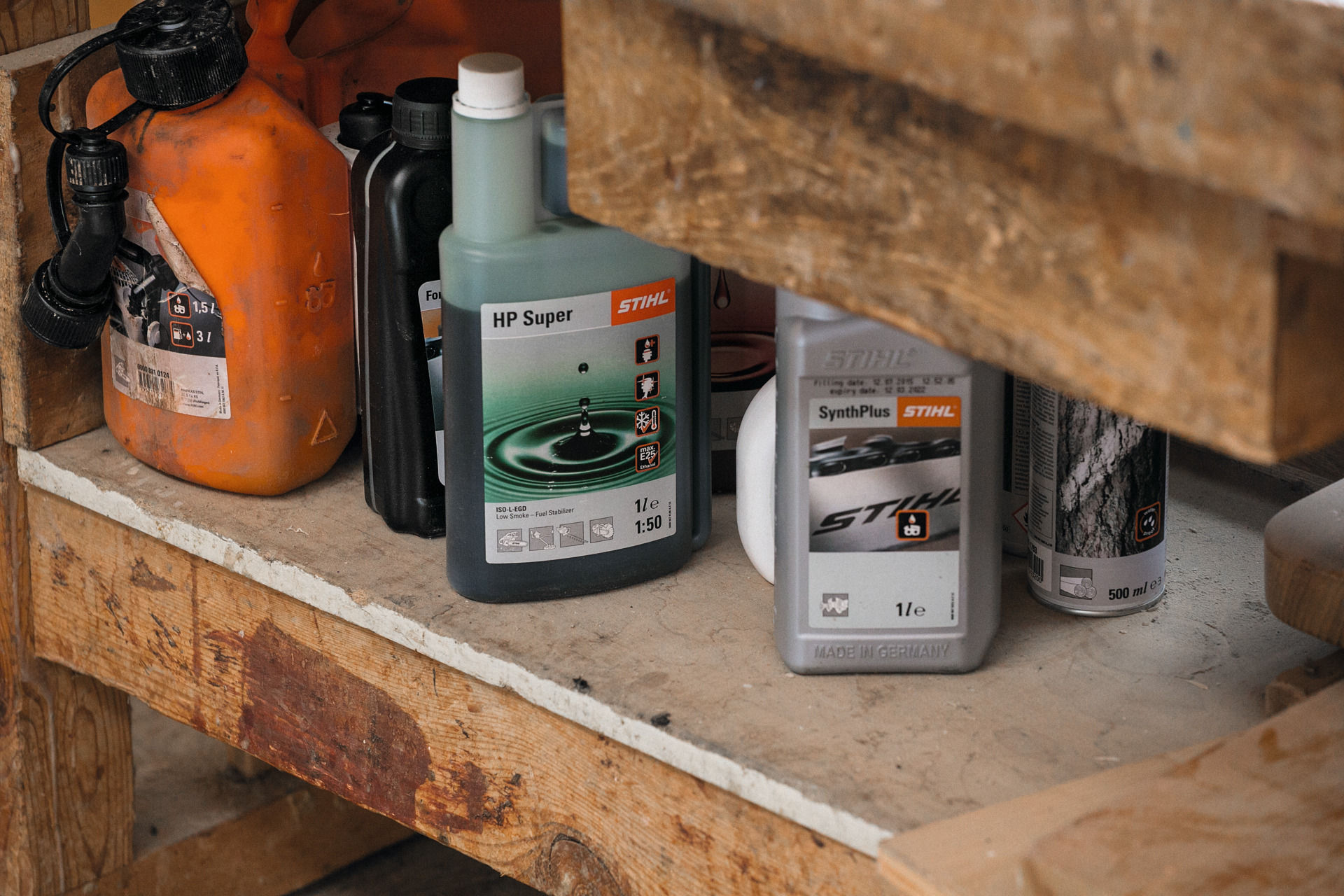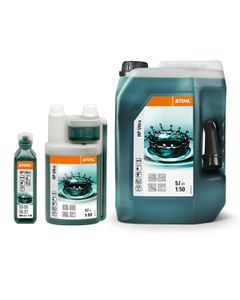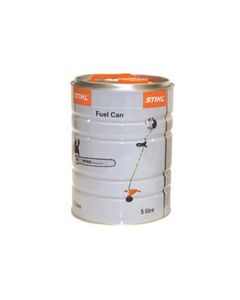Using and Mixing Fuel

THE RIGHT FUEL AND OIL RATIO FOR YOUR STIHL PETROL TOOL
It’s important to power your petrol tool with a fuel mixture made to the right recipe: unsuitable fuels and the wrong mixing ratios can cause serious damage, leading to piston seizure, excessive wear, and ultimately a shorter lifespan for your tool.
- 1:50 = 1 part oil + 50 parts petrol, or 20 ml oil per litre of petrol when using STIHL 2-Stroke Engine Oil
- When using other brands of oil, mix according to the manufacturer’s specifications. Any two-stroke engine oil you use in your petrol gardening tool must have the TC classification.
You can also refer to the table below to work out the proportions:
| FUEL CONTAINER SIZE* (litre) |
QUANTITY OF FUEL (litre) |
QUANTITY OF STIHL 2-STROKE OIL (ml) |
1 |
1 | 20 |
2 |
2 | 40 |
3 |
3 | 60 |
5 |
5 | 100 |
10 |
10 | 200 |
20 |
20 | 400 |
*STIHL containers have space to take the additional 20 or 40 mls
USING THE RIGHT INGREDIENTS IN YOUR FUEL MIXTURE
WHAT TYPE OF PETROL SHOULD I USE?
The petrol in your fuel mixture needs a minimum octane rating of 90 RON; the petrol that is widely available at New Zealand petrol stations is rated at 95/98 RON. Use high-quality fuel for best performance.
WHAT TYPE OF ENGINE OIL SHOULD I USE?
You should only use high-quality oil for 2-stroke engines that meet the requirements for TC classification. Your fuel should also be as fresh as possible. The STIHL 2-Stroke Engine Oil, is specially formulated for STIHL engines and will prolong the life of your tool. On top of that, STIHL 2-Stroke Engine Oil, will save you money in the long run as you only use half the amount when compared to the other brands.
We highly recommend STIHL HP Ultra Engine Oil as it is designed to completely burn away at the operational temperature of your STIHL engine and is a significantly higher quality when compared to semi-synthetic oils. Besides its low-residue combustion, it is also over 80% biodegradable and low in sulphur content.
CAUTION: Inferior products can damage the engine, sealing rings and fuel tank of your tool.
HOW TO MIX FUEL
Make up your fuel mixture in a container that is approved for use with fuels –STIHL sells a Fuel Mixing Bottle and a 5 Litre Fuel Can. Pour in the oil first, followed by the petrol; seal the fuel can and give it a good shake to combine the fuel mixture. Now you’re ready to use the fuel mixture in your tool. Take care as you open the can, in case the pressure has built up inside.
CHECKLIST: REFUELING YOUR TOOL
- CAUTION: petrol is extremely flammable, so when handling fuel mix and refilling your tool you should maintain a safe distance from any naked flame, try to avoid spilling any fuel and refrain from smoking. Refueling should be done at least 3 metres from the area where you will start your tool.
- Before you fill the fuel tank, switch the engine off completely; you should not fill it while the motor is hot, as there is a risk of fire if the fuel mix overflows.
- Open the fuel cap carefully so any overpressure dissipates gradually, and ensure that no fuel sprays out of the tank.
- You should only ever fill the petrol tank in well-ventilated spaces.
- When filling the fuel tank, take care not to spill fuel mix or get any on your clothes. If you do spill some, you must clean the power tool immediately and change your clothes.

TIPS: HOW TO ENSURE YOUR PETROL TOOL'S LONGEVITY
In addition to using the right types of petrol and engine oil and mixing them in the correct proportions, here are some more important points to keep your petrol gardening tool working well.
TIP#1: AVOID STORING 2-STROKE FUEL MIX FOR MORE THAN 30 DAYS
Only mix small quantities of fuel at a time, you should not leave mixed fuel stored in a container or in the tool for more than 30 days. If you are not going use your tool for a month or more, empty the tank and run it dry before putting it away.
- Stored fuel is likely to be infiltrated by the oxygen and moisture in the air. This can be detrimental to the fuel mix as it may affect the composition by potentially attacking and even eliminating additives such as antioxidants or corrosion protection. These additive components help improve the properties of the fuel.
- Long storage can also result in the formation of a resinous “gum”, which is residue left behind when the fuel evaporates. Gum in the fuel can lead to deposits in the engine combustion chamber, as well as adhesions and blockages in fuel nozzles and filters.

TIP#2: WATCH OUT FOR SEPARATION IN YOUR FUEL MIX
In 2-stroke fuel mix with ethanol fuels, the oil and petrol are liable to separate relatively quickly, as ambient moisture binds to the ethanol and sinks to the bottom of the mix. Once it separates, your fuel mix no longer has an even distribution of 2-stroke engine oil throughout it, so you cannot be certain that the engine is properly lubricated. Insufficient lubrication and cooling could cause problems with the functioning of your tool, or even piston seizure. A separated fuel mix is no longer a correctly mixed product, even if you shake it vigorously.
TIP#3: I USED THE WRONG FUEL IN MY TOOL, WHAT SHALL I DO?
If your fuel tank contains an incorrect fuel mix, you must not use the tool at all – even for a short time. Use a funnel to empty the tank and pour the incorrect fuel into a safe canister, then fill the tank with the correct fuel mix. Though this is generally enough to remedy the issue, if you find the tool doesn’t start you might also need to clean the spark plug.
SUMMARY: STIHL FUEL MIX
- Using the right fuel mixture in your petrol tool protects it from damage such as piston seizure
- We recommend using a 50 to 1 fuel mix: 1 part oil to 50 parts of petrol, or 20 ml oil per litre of petrol
- When using other brands of oil, mix according to the manufacturer’s specifications. Any two-stroke engine oil you use in your petrol gardening tool must have the TC classification.







